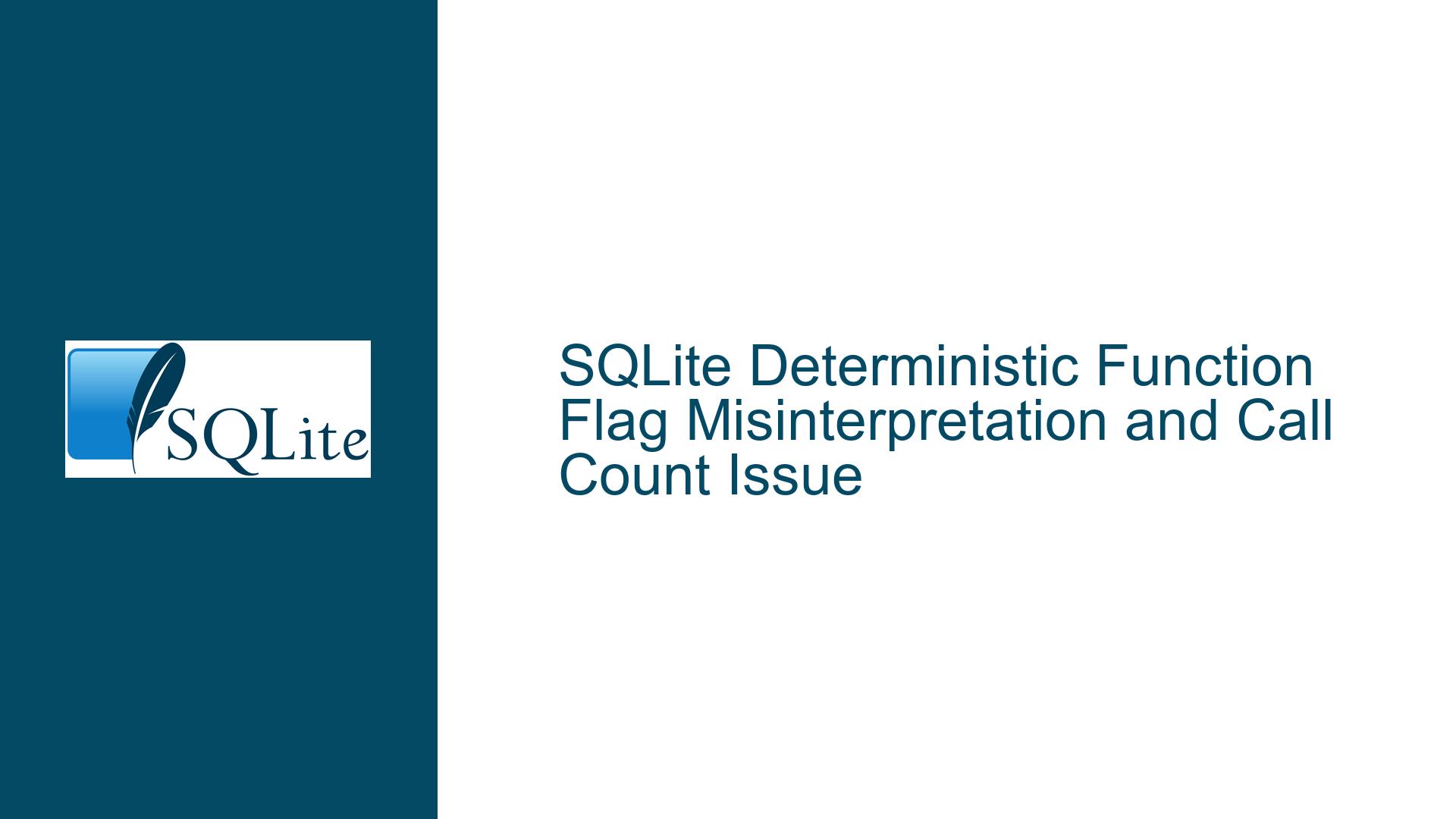SQLite Deterministic Function Flag Misinterpretation and Call Count Issue
SQLite Deterministic Function Flag Misinterpretation Leading to Multiple Function Calls
The core issue revolves around the misinterpretation and misuse of the SQLITE_DETERMINISTIC flag in SQLite, particularly in the context of user-defined functions. The flag is designed to inform SQLite that a function’s output is solely determined by its input parameters, allowing the database engine to optimize queries by potentially reducing the number of function calls. However, a common misconception is that setting this flag guarantees that the function will only be called once, even when the function appears multiple times in a query with identical parameters. This misunderstanding has led to unexpected behavior in applications, particularly in unit tests where the number of function calls is being explicitly checked.
The issue becomes apparent when a user-defined function, marked as deterministic, is called multiple times within a query. For example, in a Python unit test, a mock function is created with the deterministic=True flag, and the expectation is that the function will only be called once when used in a query like SELECT deterministic() = deterministic(). However, the function is called twice, leading to a failed test assertion. This behavior is not a bug in SQLite but rather a misinterpretation of what the SQLITE_DETERMINISTIC flag guarantees.
The SQLITE_DETERMINISTIC flag allows SQLite to optimize queries by assuming that the function’s output will be the same for identical inputs. This assumption enables SQLite to cache the result of the function call and reuse it, but it does not mandate that the function will only be called once. The optimization is optional and depends on the query planner’s decisions. In some cases, SQLite may still choose to call the function multiple times, especially if the query planner determines that caching the result is not beneficial or if the function is used in a context where caching is not feasible.
Misaligned Expectations Between SQLite and Application Code
The root cause of the issue lies in the misalignment between the expectations of the application code (or unit tests) and the actual behavior of SQLite. The application code assumes that marking a function as deterministic will enforce a single function call, while SQLite treats the flag as a hint for potential optimization rather than a strict requirement. This misalignment is further exacerbated by changes in SQLite’s behavior across different versions, particularly in response to bug fixes and optimizations.
In the specific case of the Python unit test, the test assumes that the deterministic flag will result in a single function call when the function is used in a query like SELECT deterministic() = deterministic(). However, SQLite’s query planner may still decide to call the function twice, especially if it determines that caching the result is not beneficial. This behavior is consistent with SQLite’s design, where the SQLITE_DETERMINISTIC flag is used to enable optimizations but does not enforce them.
The issue is further complicated by the fact that SQLite’s behavior can vary depending on the version and the specific query being executed. For example, in SQLite 3.32.3, changes were made to address a bug related to the handling of deterministic functions, which may have inadvertently affected the behavior of certain queries. These changes were intended to improve the correctness and performance of SQLite but may have introduced unexpected behavior in applications that rely on specific assumptions about how deterministic functions are handled.
Correcting Misinterpretations and Aligning Application Logic with SQLite’s Behavior
To address this issue, it is essential to correct the misinterpretation of the SQLITE_DETERMINISTIC flag and align the application logic with SQLite’s actual behavior. The first step is to understand that the SQLITE_DETERMINISTIC flag is a hint for optimization, not a guarantee of a single function call. Applications should not rely on the flag to enforce a specific number of function calls but should instead design their logic to handle multiple calls if necessary.
In the context of unit testing, the test should be updated to reflect the actual behavior of SQLite. Instead of asserting that the function is called only once, the test should verify that the function’s output is consistent across multiple calls. This approach aligns with the intended use of the SQLITE_DETERMINISTIC flag, which is to ensure that the function’s output is determined solely by its input parameters.
For example, the Python unit test could be modified as follows:
def CheckFuncDeterministic(self):
mock = unittest.mock.Mock(return_value=42) # Ensure the function returns a consistent value
self.con.create_function("deterministic", 0, mock, deterministic=True)
result = self.con.execute("select deterministic() = deterministic()").fetchone()[0]
self.assertTrue(result) # Verify that the function's output is consistent
self.assertGreaterEqual(mock.call_count, 1) # Allow for multiple calls
This updated test verifies that the function’s output is consistent across multiple calls, which is the intended behavior of the SQLITE_DETERMINISTIC flag. It also allows for multiple function calls, reflecting SQLite’s actual behavior.
In addition to updating unit tests, applications should consider other strategies for optimizing function calls if necessary. For example, applications can manually cache the results of deterministic functions and reuse them within the same query. This approach provides more control over the number of function calls and ensures consistent behavior across different versions of SQLite.
Another approach is to use SQLite’s built-in caching mechanisms, such as the WITH clause or temporary tables, to store the results of deterministic functions and reuse them within the same query. This approach leverages SQLite’s optimization capabilities while providing more predictable behavior.
For example, the following query uses a WITH clause to cache the result of a deterministic function and reuse it within the same query:
WITH cached_result AS (
SELECT deterministic() AS result
)
SELECT result = result FROM cached_result;
This query ensures that the deterministic function is only called once, and the result is reused within the same query. This approach provides more predictable behavior and aligns with the intended use of the SQLITE_DETERMINISTIC flag.
In conclusion, the issue of multiple function calls in SQLite when using the SQLITE_DETERMINISTIC flag is primarily a result of misaligned expectations between the application code and SQLite’s behavior. By understanding the intended use of the flag and aligning the application logic with SQLite’s actual behavior, developers can avoid unexpected issues and ensure consistent performance across different versions of SQLite. Updating unit tests to reflect the actual behavior of SQLite and leveraging SQLite’s built-in caching mechanisms are effective strategies for addressing this issue.






